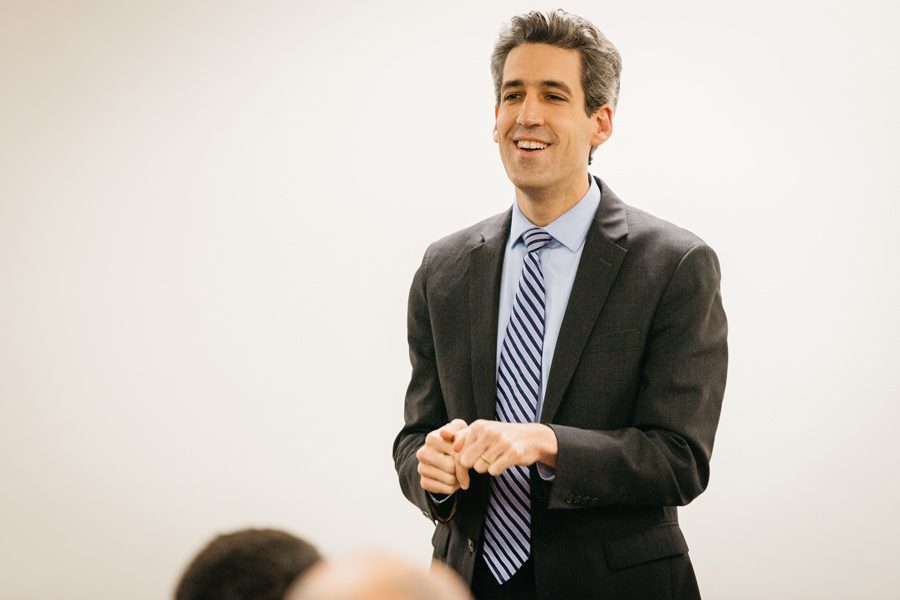Biss talks gubernatorial campaign at Political Union, College Democrats town hall
Noah Frick-Alofs/Daily Senior Staffer
State Sen. Daniel Biss (D-Evanston) speaks to students about his gubernatorial campaign in Norris University Center on Monday. Biss covered his campaign initiatives, including changes to the Illinois tax policy and the introduction of a single-payer healthcare system.
November 14, 2017
Coming from the Massachusetts Institute of Technology with a doctorate in mathematics, state Sen. Daniel Biss (D-Evanston) thought he would spend the rest of his life teaching at a university. But when the United States went to war with Iraq in 2003, he said he could no longer stay in academia.
“The president was lying to us, the country was spinning out of control, empiricism didn’t seem to mean anything anymore and I just felt like I had to do something about it,” Biss said.
So Biss said he grabbed a clipboard, started knocking on doors and fell in love with community organizing, “the most important way to build power and make change.”
The state senator, who is running for Illinois governor, spoke to about 60 students in Norris University Center at a Monday town hall hosted by College Democrats and Political Union. Biss began his political career in the Illinois House of Representatives and then served as state senator for the 9th District, which includes Evanston.
In the gubernatorial primary, Biss will face candidates including Chris Kennedy (Kellogg ’94) and J.B. Pritzker for the Democratic nomination. Biss’ platform includes raising the minimum wage, creating a dependable pension system and instituting a progressive tax system.
Biss said the state needs to make “bold, transformative” changes to its tax policy, beginning with repealing the flat tax provision — which sets a uniform tax rate for all residents — and creating a tax bracket for the wealthy.
“Illinois is one of only four states in the union whose constitution mandates that we have a flat tax,” Biss said. “If you look at where the economy has moved over the course of the last few decades, more and more and more of the wealth is at the top.”
A progressive tax system could bring in an extra $10 billion per year in state revenue to improve schools, Biss said. He added that Illinois has the most “regressive” system of school funding of any state in the country. Education funds in Illinois currently rely more heavily on property taxes than those in any other state, he said, leading to higher property taxes and greater inequalities between school districts.
Biss also advocated for a single-payer health care system in the state.
“The private, for-profit health insurance company acts like a vacuum cleaner sucking money out of our health insurance system, making it more expensive without improving the health care we get,” Biss said.
He said the Affordable Care Act first began in Massachusetts before it was translated into federal policy, and the same needs to happen with a single-payer system.
Weinberg senior Alexander Vasconcelles, a field organizer fellow for Biss’ campaign, told The Daily that Biss’ stance on health care resonated with him. He said he spent a summer in Washington examining health care policy and realized it was a conversation that should be held at the state level.
“While it’s important to have it at the national level, the states are the incubators for policy,” Vasconcelles said. “That’s where policy can be tweaked and developed.”
Political Union co-president Avi Dravid told The Daily that it is important for the community to engage in dialogue with local leaders, especially given how “polarized” the country is.
“I’m willing to bet that a lot of people here didn’t agree with everything (Biss) said,” the Weinberg junior said. “But the fact that they were able to sit down and engage in that dialogue with him for around an hour is something … we need to see more of in our democracy.”
Email: meilynnshi2020@u.northwestern.edu
Twitter: @meilynnshi



